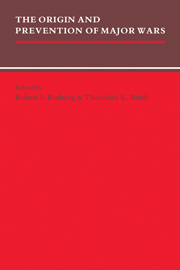Book contents
- Frontmatter
- Contents
- Introduction
- The Origins of War: Structural Theories
- The Origins of War: Explanation of Non-rational Causality
- Lessons and Analogies from Early Major Wars
- Ideology and Conflict: The Wars of the Ottoman Empire, 1453–1606
- The Origins of the Thirty Years' War
- The Origins, Causes, and Extension of the Wars of the French Revolution and Napoleon
- Lessons and Analogies from the World Wars
Ideology and Conflict: The Wars of the Ottoman Empire, 1453–1606
Published online by Cambridge University Press: 02 December 2009
- Frontmatter
- Contents
- Introduction
- The Origins of War: Structural Theories
- The Origins of War: Explanation of Non-rational Causality
- Lessons and Analogies from Early Major Wars
- Ideology and Conflict: The Wars of the Ottoman Empire, 1453–1606
- The Origins of the Thirty Years' War
- The Origins, Causes, and Extension of the Wars of the French Revolution and Napoleon
- Lessons and Analogies from the World Wars
Summary
This analysis of the wars of the Ottoman Empire between the mid-fifteenth and early seventeenth centuries tests the proposition that we can enhance our understanding of the origins of war by study of the past. Embedded within the analysis, and integral to it, is a critical examination of the application of historical analogy to current issues of war and peace and of the role which theory plays in the process. The article grew out of the author's observation that contemporary Americans and western Europeans tend to view war as a formally recognized state of conflict between sovereign nations, sharply delineated from peace and prosecuted by major field, naval, and air operations. Two primary English-language dictionary definitions, separated by nearly a half century, reflect both this theory of war and the historical experience of eighteenth-century Europe from which it was drawn:
a state of usually open and declared armed hostile conflict between political units (as states or nations) (cannot exist between two countries unless each of them has its own government).
Webster's Third New International Dictionary (Springfield, Mass., 1981)
a contest between nations or states (international war) or between parties in the same state (civil war), carried on by force of arms for various purposes, as to settle disputes about territorial possessions, to maintain rights that have been interfered with, to resist opression, to avenge injuries, to conquer territory to extend dominion, etc.
- Type
- Chapter
- Information
- The Origin and Prevention of Major Wars , pp. 149 - 176Publisher: Cambridge University PressPrint publication year: 1989

